- Home
- Johnny D. Boggs
Whiskey Kills Page 7
Whiskey Kills Read online
Page 7
The lawyer pointed to a bench in front of the barber shop, and Daniel sat down. “They just got the writ,” Coyne said after he dropped beside him, withdrawing a handkerchief from his vest pocket and dabbing his brow.
“Got warm all of a sudden,” Coyne said.
“It’ll do that,” Daniel said, just to say something.
“I could use a beer . . . oh, never mind. Ignorant of me. Forgive me. How . . . how does it feel to be free?”
“Why did they let me go?”
Coyne gleamed. “I told you I could play Greer County against them, Daniel. Wasn’t sure if Judge Goodman would go for it or not, but he did.”
Waiting again.
Finally Vaughan Coyne caught his breath, and color began seeping back into his face. “The county solicitor and I met in the judge’s chambers.” Coyne adjusted his spectacles. “Greer County is disputed territory. You know that. Texas wants it. The federal government claims it. A criminal trial is the last thing the Texas government wants to see in Greer County. It would lead to appeals, of course, and, eventually, the Supreme Court would have to decide on jurisdiction, on who actually owns that country. I persuaded Judge Goodman that the last thing he’d want is a trial. Didn’t take much persuasion. And Judge Goodman persuaded . . . no, he demanded . . . the county solicitor to quash the indictment right then and there. What do you say to that, Daniel?”
He didn’t know how to respond. “Thank you,” he said at last.
“Thanks aren’t necessary. I wish all my cases were so simple. I wish I had more cases, actually more clients.”
Daniel remembered the money purse, reached for it, but the lawyer read his mind, and put his hand on Daniel’s forearm. He had a surprisingly brutal grip. “I told you yesterday, Daniel, that there was no charge for this service. You’re good publicity, my friend. That’s payment enough.”
When Coyne released his arm, Daniel found a greenback. “I could,” he said hesitantly, “at the least, buy you . . . that beer.”
Leaning his head back against the frame wall of the barbershop, Vaughan Coyne cackled. “As long as it’s not ginger beer.” And stopped immediately, shaking his head, removing his glasses, apologizing again for a bad, bad joke. “Well, anyway, I do appreciate the sentiment, but you know you couldn’t have that beer with me. They won’t let an Indian in the saloons here, not even a policeman.”
“You have one yourself. Beer, whiskey, or wine. I must go.”
He started to rise, but the vise gripped him again, and Coyne pulled him back to the bench. “Wait a minute, Daniel. What’s next? As your attorney, I want to know. Do you drop this whole matter?”
His head shook.
“You must tread lightly, Daniel.” He looked up and down the boardwalk, even through the windowpane to check out the barbershop. “Blake Browne is not a man to trifle with. He’s been roaming these parts for forty years. And he has the Texas Rangers, at least Carl Quantrell, backing him.”
Silence. Looking across the street at the mercantile. Like a Comanche.
“You’re a free man. Best thing for you to do is forget Blake Browne, get back to Cache Creek, help your people, help yourself. Don’t do anything foolish. Just forget everything. I warned you about Huntsville prison. The next time, the judge might decide he’d like to get his name in the papers, fight for Texas, fight against the United States. You know what happened to that Indian in Huntsville, Satanta, one of your people, don’t you?”
Daniel shrugged. He remembered Satanta, though just barely, remembered his mother pointing him out when the Kwahadi were still free, when they were preparing to fight the taibo killers of buffalo at the place in El Llano Estacado called Adobe Walls. Only Satanta was not of The People. He was a big blow-hard, who loved to hear himself talk. A Kiowa, known as Set-t’ainte, or White Bear. Twice he had been sent to the Tejano prison in Huntsville. When Daniel was a boy, maybe a year before the Pale Eyes had grabbed him and sent him to Pennsylvania, they had heard the news of Satanta. The big man, depressed that he would never be freed from prison a second time, had leaped from the second-story landing of the prison hospital, and fallen to his death.
But he was not Set-t’ainte, and had no plans of going to the Huntsville prison.
“You hurt Blake pretty good, and,” the lawyer was saying, “trust me, he’ll get his come-uppance.”
“Two of my people are dead,” Daniel said. “I do not forget these things.”
Coyne wet his lips. “I hate Blake Browne as much as you do. I’d like to fight him. Put him behind bars.”
“So would Harvey Noble.”
“Noble? Oh, yes, the federal marshal. Well, let’s fight him together.”
A minister walked past, offering the briefest nod. The wind picked up, and the sun dropped lower.
“Have you heard of a man called Dakota?” Daniel asked.
Slowly the lawyer shook his head. “Where did you hear that name?”
Daniel shrugged. “It was something Blake Browne said. When I went to his camp, he said that I must be working for Dakota. I take it that he did not like Dakota.”
“A lot of people don’t like Blake Browne.”
Daniel said nothing.
“So you think . . . that this Dakota . . . is . . . ? What do you think, Daniel?”
He shook his head. “I don’t think anything.” He was looking again at the mercantile. He was thinking, though, not about Dakota, not even about Blake Browne. He was thinking about Harvey P. Noble, remembering him opening that note pad, writing down the names of Quantrell and the whiskey runner. He was thinking of some advice the Cherokee Hugh Gunter had given him a long while back.
If you want to be a detective, a real policeman, you can’t go off jumping to no conclusions. That’ll get you in trouble. You got to think. Think hard. And take notes.
So, Daniel was thinking: Could I buy an Old Glory writing tablet, a Columbus lead sharpener, and a pack of Faber’s No. Two pencils at Kemp’s store? Would they sell to a Comanche?
“I’ll ask around,” Coyne said. “Let’s work together. I’ll get word to you about anything I learn, about Browne, about Quantrell, about this Dakota character. Now, what are your plans? We have to stop Blake Browne. But let’s do this legally. By the white man’s law. I want this man to be punished as much as you do. Poisoning an old man with bad whiskey. Getting a young girl killed. That’s not right.”
* * * * *
It felt good to be back among his people. There were no repercussions from his arrest. In fact, now the Comanches, Kiowas, and Apaches treated Daniel as nothing less than a hero, a warrior who had defeated the hated Tejanos by their own brand of fighting.
“You are the only Nermernuh who has one of these law-yers,” Rain Shower told him. “Even Quanah does not have a law-yer. A rich taibo, is he not, this Coyne man?”
“He did not get rich representing me,” Daniel said with a shrug.
“Is he handsome?”
Daniel stopped chewing the stringy beef. He stared at the pretty girl, who giggled, but never stopped looking at him. Finally he shrugged, and reached for the pot to refill his cup with coffee.
“I missed you,” Rain Shower said. “I worried for you.”
He tried to think of something to say, but then Ben Buffalo Bone came charging out of his lodge, screaming Daniel’s name like a mountain lion, singing out praises of Daniel’s courage. With a sigh, Rain Shower returned to her place beside her mother at the cook fire. As she left, and as her brother approached, Daniel also sighed.
“Did you see Nácutsi in the jail in Texas?” Ben Buffalo Bone said.
“No,” Daniel answered.
“He is there now,” Ben Buffalo Bone said, taking Daniel’s coffee cup as his own. “Twice Bent Nose and Mean Dog took him, and four other prisoners. They probably arrived after you left. Mean Dog likes to take his time on these matters.”
Daniel considered this. The court in Wichita Falls was for serious offenders. Nácutsi had been drunk, had gotten into
a fight with Daniel—although Daniel had been the one who had started it—but that was a case for Quanah’s Court of Indian Offenses, not a judge in Texas.
“You were right to send me to Nácutsi’s lodge, Bávi.” Ben made a face, and tossed the coffee, cup and all, to his side. “There was much whiskey there. Too much for one man to drink.”
“He was selling whiskey,” Daniel said, as if he had known it for some time. Maybe he had.
Ben nodded.
“The bottles?”
Ben’s head bobbed again. “Like the one he had. I do not know the taibo words, but the markings were the same. The same as the one Toyarocho held that day. The same as the one you brought from the lodge of the great Penateka who is no more, the one you threw at the head of the taibo man with the red hair. You know of what I speak.”
“Yes,” Daniel said. He knew too well.
Ceramic stoneware with blue letters.
Coursey & Cox Bottling Works
Home Brewed
GINGER BEER
Dallas, Texas
They had been speaking in Comanche. Now, Daniel muttered in English: “It doesn’t make a damned bit of sense.”
Chapter Nine
Steam floated like heavy smoke above the two coffee cups Major Becker set on his desk. Daniel watched as the doctor picked up the nearest one and drank, never flinching, while Daniel quickly pulled his hand away after burning his fingers on the handle. He decided he’d wait. Besides, it was black coffee. No sugar. No milk. The doctor didn’t even offer anything, and Daniel, like most Comanches, really liked his coffee sweeter than sugar cookies.
“Sergeant,” Major Becker said, “I’ve seen my share of whiskey poisoning in this man’s army. Seen enlisted men, officers, even doctors drink themselves to death, over years, and over hours. The United States Army, apparently, has a quota to recruit drunkards by the score. What is it that you wish to know?”
Daniel nodded. “Symptoms,” he said, then thought he should explain. He had told Leviticus Ellenbogen of his suspicions, that Seven Beavers had been poisoned by bad whiskey—that if he could link Blake Browne to that man’s death, then they could charge the whiskey runner with manslaughter—but the agent had suggested the old Penateka had died of alcoholism, that Daniel was letting his hatred blind him to reason. Daniel told Becker what he had found at Huupi, inside the lodge, told him as much as he could remember.
“Mister Ellenbogen has a point,” Becker said softly. “I don’t know that I ever met this Seven Beavers, but I have seen a lot of your people, a lot of Kiowas, too, drink too much whiskey, and die from that. I’ve seen a lot of my soldiers do the same.”
Daniel nodded. “Symptoms,” he said again.
“Yes. Of course. Well, I don’t know that I ever paid that much attention to these symptoms. When I was first studying medicine, my teachers . . . including my God-fearing, liquor-hating mother . . . told me that those who were slaves to liquor had a inner weakness, lacked moral courage, and that was to blame for their drunkenness. Now I, and many other doctors, believe there is much more to it, like there is a disease. They drink, and drink more, and more. Because they cannot stop, because the disease demands this. Courage and morality have nothing to do with it. It’s tougher, of course, among your people, and other Indians. They can’t hold their liquor as well. Lack a tolerance for it. So alcohol has a worse effect on them.”
Daniel was getting tired of nodding.
“Symptoms. Yes. Well, there is always the strong stench of alcohol. This Seven Beavers would have stunk of whiskey. He would have been unresponsive, probably unconscious. Perhaps he just passed out. That’s common for a drunk, but as far as fatal poisoning, there would be more serious symptoms. His skin would be cold, clammy. Much of his color would have been gone.”
Watching Daniel, Becker took another sip of coffee, and pointed the cup at him. “That’s a good idea, Sergeant. Writing all this down. I should think to do this. What I’m saying sounds pretty good. Maybe I’ll write an article for the Army and Navy Journal.” Becker drank again, set the cup down, and said: “His skin might be blue.”
“A blue Indian?” Daniel grinned.
“Did you see the body?” Becker asked.
Daniel shook his head. “He was on his way to The Land Beyond The Sun when I arrived at Huupi.”
“Agent Ellenbogen is right, I’m afraid, Sergeant. You would have a hard time getting an indictment against Browne without any evidence. There’s a difference, a big difference, between bad whiskey and too much whiskey, although some symptoms might be the same. You said you found the whiskey bottle?”
“Yes. But I threw it at the Tejano with the red hair.”
The doctor failed to choke down his laugh. “And what of this dead kitten?”
“It had lapped up the whiskey that had spilled,” Daniel said. “At least that’s what I think. It had coughed up blood. So did the old Penateka.”
Becker shrugged. “That could be bad whiskey. But it could also be a symptom of drinking too much whiskey. Many drunks have bleeding ulcers.”
“Can a kitten drink too much whiskey?” Daniel asked. “Or get an ulcer?”
The doctor was reaching for his cup. He stopped, stroked his chin instead. “Like Mister Ellenbogen said, it’s still grasping at straws. Without evidence.”
“I know. You say you have seen much whiskey at this fort.”
“At this fort, and many others. On battlefields. In towns. For many years.”
“So you know whiskey?”
Becker laughed. “Some say I do.”
“I don’t know whiskey. Not well. Just from what I’ve seen with The People. And, yes, with your people. If the whiskey was bad, the whiskey that Blake Browne was selling, would it kill just one kitten and one Penateka?”
“I would think others would have been affected,” Becker said.
“So would I,” Daniel said.
“Maybe they have.”
Daniel waited, wondering.
“This whiskey runner cut a wide swath, didn’t he? You said your lawyer mentioned Teepee City . . . that Browne might have been selling whiskey over there, too.”
Daniel nodded.
“Well, you might ask around, find out if anyone else has died. Not just Indian. A settler in Teepee City. Maybe somebody in Wichita Falls, or a farmer on the Pease River. Maybe over at Doan’s Store.”
“Yes,” Daniel said. This doctor was smart. Smarter than he was.
“There’s something else,” Becker said, and Daniel waited again.
“You said you destroyed many bottles of Blake Browne’s whiskey. Well, those bottles could have contained the poisoned whiskey. Seven Beavers just had the bad luck to buy one made from the batch that was lethal. Maybe you saved a bunch of lives. We’ll never know.”
Daniel sighed. He didn’t know how to feel. Maybe he had saved many of The People, many taibos who lived in Greer County, many settlers in Teepee City. Maybe he had destroyed the evidence he needed to hang or, at least, imprison Blake Browne.
“I have some bottles,” Daniel said. “Outside.”
“I thought you destroyed all of Browne’s whiskey.”
“These were found at the lodge of Nácutsi. Fifteen bottles.”
“That’s quite a thirst for one brave.”
“He was selling the whiskey, too. I think he was selling for Blake Browne.”
“There are more whiskey runners on the reservation than this omnipresent Mister Browne,” Becker said.
“That is true.” Daniel waited. “Maybe Nácutsi worked for Dakota.”
“Dakota?”
Daniel let out a sigh. “Just a name I’ve heard.” Then he blurted out: “Have you heard of him?”
“I’m afraid not.”
Silence.
“What do you want me to do with these bottles?” asked Becker.
“See if they are poison.”
Becker finished his coffee. “All right. You have more faith in me that I have in myself, but I’ll
help. I’m not much of a chemist, but I guess I can tell if the whiskey is just bad whiskey, regular forty-rod, or poison whiskey. Let’s go.”
Leading the way, Daniel left the post hospital, and showed Major Becker the two wooden cases strapped on a pack on a patient, ugly mule. Each man took a case and, bottles rattling, set the boxes on the porch. Becker grabbed one bottle by the neck and pulled it up for inspection. He stared briefly, put the bottle underneath his arm, and found another bottle. His face changed. He knelt, studying the case, wet his lips, and looked up at Daniel.
“Every bottle’s the same,” he said.
“Yes,” said Daniel.
“I’ve never seen that before. Not here.”
Daniel agreed. “Nácutsi had these. All of Blake Browne’s bottles were these. The Penateka who is no more had this bottle. That is what was beside the dead kitten. And this is the kind of bottle we found with Toyarocho, the one who killed his daughter by accident.”
Becker read the label, and sighed. Slowly he rose, and told Daniel: “You might want to talk to one of our soldiers, Sergeant, when he returns to the post. He’s on patrol now. A Seventh Cavalry trooper named Fenn O’Malley.”
* * * * *
Spring had taken root, hot, windy, with threatening dark clouds blacking out the sun. Typical.
Reining in the buckskin, Daniel dropped his right hand by the Remington in the holster, and watched the rider move between the trees to the south near the confluence of Cache Creek and the Red River. The only men he had seen were a couple of cowboys driving longhorns to the pastures they leased from The People. The man riding out of the woods, however, was not white, although it took Daniel a minute before he recognized the long graying hair and tall silk hat.
“O-si-yo,” the smiling rider greeted in Cherokee.
“You’re a long way from Muskogee,” Daniel told Hugh Gunter.
“You ain’t too close to the Comanche agency.” Gunter pulled the blue roan to a stop, and offered his right hand.
They shook hands.
“Rode over to see you at your horse-smelling home,” Gunter said. “Ben Buffalo Bone sent me down here. You’re a tough guy to track down. Move like a raven.”

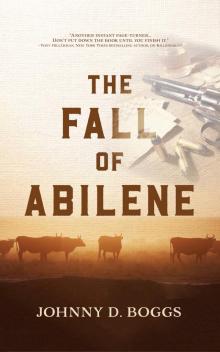 The Fall of Abilene
The Fall of Abilene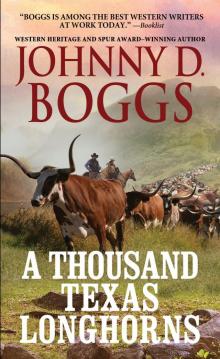 A Thousand Texas Longhorns
A Thousand Texas Longhorns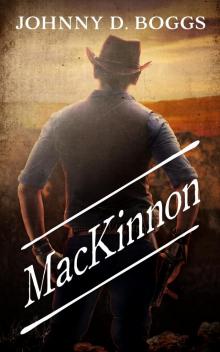 MacKinnon
MacKinnon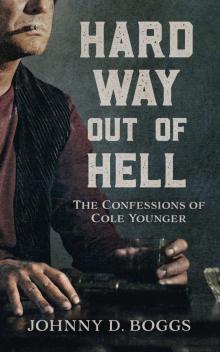 Hard Way Out of Hell
Hard Way Out of Hell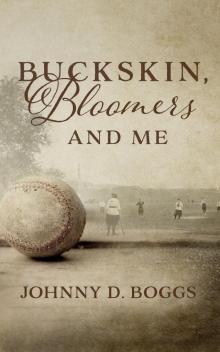 Buckskin, Bloomers, and Me
Buckskin, Bloomers, and Me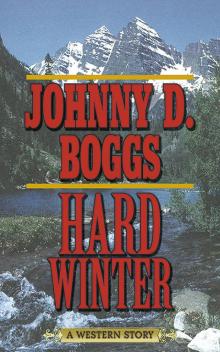 Hard Winter
Hard Winter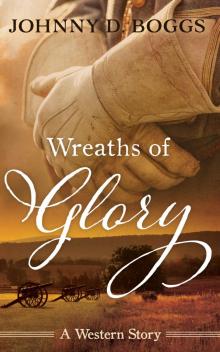 Wreaths of Glory
Wreaths of Glory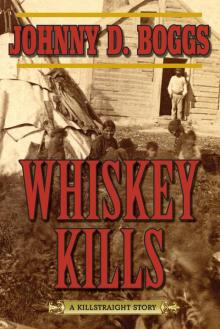 Whiskey Kills
Whiskey Kills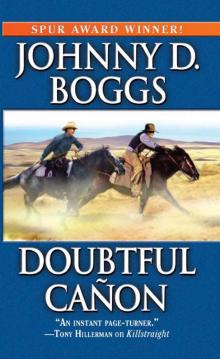 Doubtful Canon
Doubtful Canon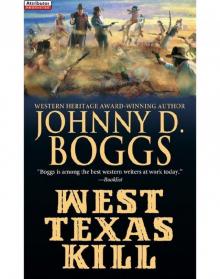 West Texas Kill
West Texas Kill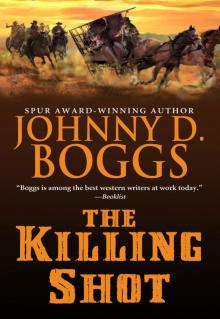 The Killing Shot
The Killing Shot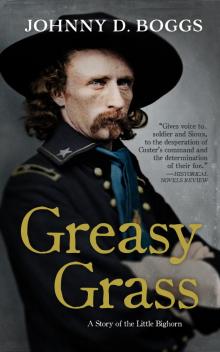 Greasy Grass
Greasy Grass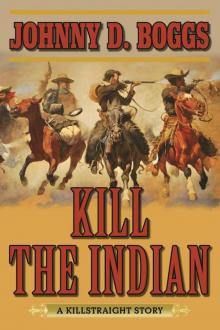 Kill the Indian
Kill the Indian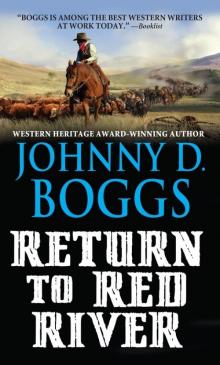 Return to Red River
Return to Red River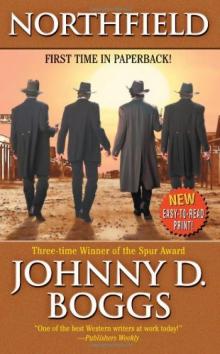 Northfield
Northfield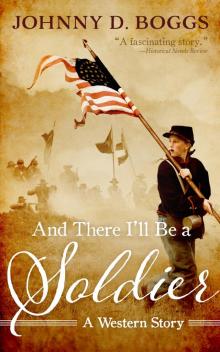 And There I’ll Be a Soldier
And There I’ll Be a Soldier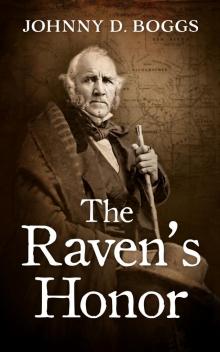 The Raven's Honor
The Raven's Honor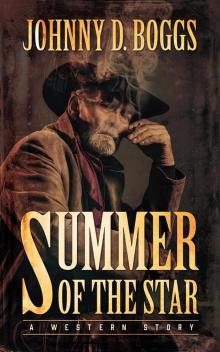 Summer of the Star
Summer of the Star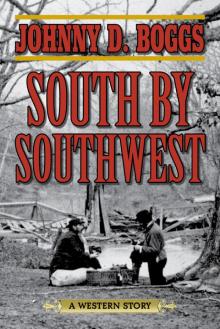 South by Southwest
South by Southwest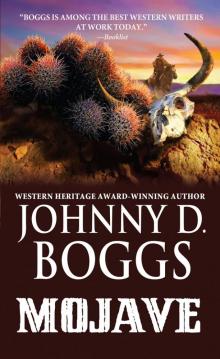 Mojave
Mojave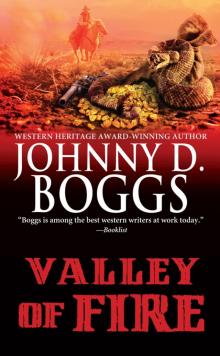 Valley of Fire
Valley of Fire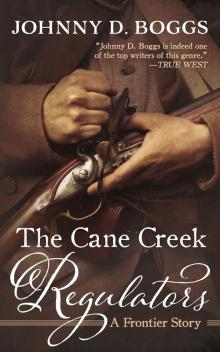 The Cane Creek Regulators
The Cane Creek Regulators